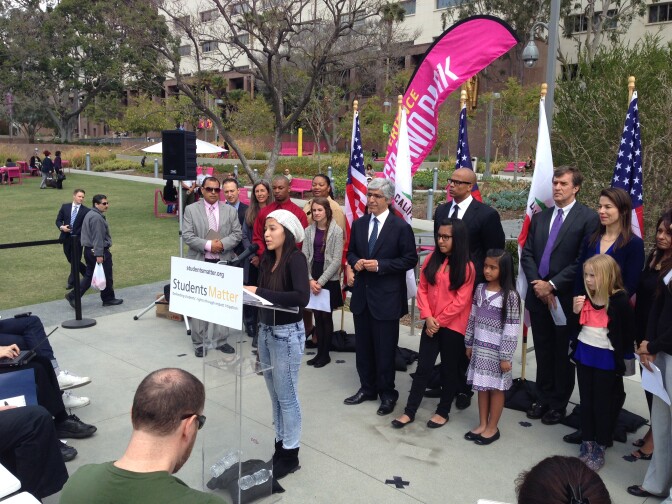This story is free to read because readers choose to support LAist. If you find value in independent local reporting, make a donation to power our newsroom today.
This archival content was originally written for and published on KPCC.org. Keep in mind that links and images may no longer work — and references may be outdated.
Vergara plaintiffs file latest appeal, wade into legislative debate on teacher job protections

Plaintiffs in the Vergara v. California lawsuit formally asked the state Supreme Court take up their case on Tuesday, as expected, arguing that a panel of appellate justices erred in reinstating several teacher job protection laws a lower court judge had previously struck down.
But the advocacy group backing the plaintiffs, Students Matter, is also pivoting its efforts to the state legislature, lending tentative support this week to a wide-ranging bill promising an overhaul for many of the protections — like teacher tenure and seniority-based safeguards against layoffs — that the Vergara lawsuit would eliminate entirely.
The state's two largest teachers unions recently came out in opposition to the bill, AB 934, saying the changes it proposes go too far; Students Matter lent its support despite misgivings the bill doesn't go far enough.
But the bill's author, Assemblywoman Susan Bonilla, D-Concord, says it's worth touching a third rail of California politics if it means finding a "middle way."
“This isn’t going to get solved in the courts. The court can only make a finding, and I don’t know what’s going to happen there," said Bonilla, a former high school teacher. "I think they identified some real problems [in Vergara]. That piqued my interest in coming up with a real solution.”
Here's what AB 934 would change:
- What happens to teachers who receive less-than-satisfactory evaluations. School districts would be required to create a "Peer Assistance and Review" program in which teachers who scored high marks on their evaluations would help coach teachers who received low marks. Districts would be able to apply for state block grants which would reimburse the cost of this training; Bonilla said the price tag would depend on the size of the program in each district.
- The timeline for receiving tenure. Currently, school administrators must decide whether to offer "permanent employment," or tenure, by March of a new teacher's second year in the classroom. In his 2014 decision for the Vergara plaintiffs, L.A. County Judge Rolf Treu ruled this rushed administrators into offering tenure to teachers who might not deserve it. AB 934 would give administrators more time — until the end of a new teacher's third or fourth year — to decide whether to offer tenure. Any teacher that didn't earn it in their third or fourth year would be required to take part in the training program.
- The protections non-tenured teachers receive. In exchange for a longer timeline for receiving tenure, AB 934 would give teachers who hadn't earned tenure by their third or fourth year a job protection non-tenured teachers currently don't enjoy: the right to appeal their dismissal to the school board. Administrators would also have to show cause in order to terminate a teacher in their third or fourth year of probation.
- The seniority-based teacher layoff process. AB 934 would scrap the current "last in-first out" system by which districts must lay off teachers in times of budget cuts. Non-tenured teachers with bad evaluations — "below the satisfactory level" — would be laid off first. But then, even tenured teachers who'd receive two consecutive bad evaluations would face layoffs before non-tenured teachers with better evaluation scores.
- The teacher evaluation rubric. Districts would be required to evaluate teachers on a four-tiered scale. In the Los Angeles Unified School District, for instance, teachers currently receive marks on a three-tiered scale.
Both the California Teachers Association (CTA) and California Federation of Teachers (CFT) have taken stances in opposition to AB 934, but representatives of the two teacher unions said they're still open to discussing the bill.
CFT president Joshua Pechthalt said Tuesday he likes the portions of the bill mandating collaborative, teacher-led training. But he's troubled by the links the proposal makes between teacher layoff decisions and evaluations, which he said ultimately would allow student test scores to play too big a role in staffing decisions.
"Attaching teacher evaluations to layoffs is hugely problematic," he said. "Clearly that's an area that we have asked to be explained."
Bonilla said the bill is likely headed for a hearing in the Senate Education Committee in "the third or fourth week in June."
At that time, officials with Students Matter hope lawmakers will offer changes they think would improve the bill. In a letter to lawmakers, Students Matter policy director Ben Austin urged an amendment that wouldn't allow teachers to receive tenure until at least their fourth year.
Nevertheless, in AB 934, Austin wrote, "Students Matter sees an opportunity for California’s legislative leaders to begin to address these grave inequities" of Vergara, in which the plaintiffs argued California's teacher job protections harmed low-income and minority students most.
The state Supreme Court will likely decide whether to take up the Vergara appeal later this summer.
CORRECTION: An earlier version of this story incorrectly identified Joshua Pechthalt as the CFT's vice president. He is the president.







